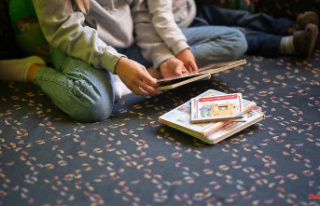Some animals are currently sitting on dry land in the truest sense of the word. The drought is a particular threat to those who live in and are directly dependent on water.
Dresden (dpa / sn) - The persistent drought with high temperatures is also causing problems for many animals. "Amphibians like the fire salamander need clear spring streams so that their larvae can grow in them. Fish suffer from high water temperatures and the associated lack of oxygen," said Felix Ekardt, chairman of the Federation for the Environment and Nature Conservation (BUND) in Saxony, the German Press Agency . But many microorganisms or insects are also tied to water-bearing streams, ponds or rivers. When bodies of water dry up, this affects individual species, but also the overall structure of the ecosystem.
"If the biotope network, i.e. the networking of habitats, is lost as a result, populations are isolated from one another and exchange is no longer possible," explained the scientist. Numerous other wild animals or insects, on the other hand, get their water requirements from food. "If there is enough food and cool hiding places, they will get through the summer well. However, it is also important here to connect the habitats in order to have alternative options."
According to Ekardt, the loss of animals in times of drought is difficult to quantify. That depends on many factors such as the quality of the habitats, the availability of food and also the extent to which the habitat has already been fragmented. "Statements as to whether the drought is leading to losses in stocks must be scientifically examined over several years. In general, drought and heat are additional stress factors for many animals, which are now added to other stresses - such as the loss of habitat through sealing or its fragmentation through streets.
"In the short term, it is now important to allow animals to retreat and rest at water points such as streams and lakes, in wetlands and forests," emphasized Ekardt. Unnecessary disturbances cost them energy and increased their water requirements. Insects, reptiles, mammals and birds were happy about additional water points - from the pond to the water bowl on the balcony or in the garden. Drinking vessels should be cleaned regularly. Sticks and stones protruding from the water are useful for insects to land safely.
"In addition, the animals now appreciate cool and damp hiding places. Piles of leaves, the compost in the garden, bushes, but also mulched beds can mean salvation in the drought and heat," said Ekardt. Everyone can contribute to this in the garden or on the balcony. In the long term, animals are helped above all by water retention in the landscape, for example through water body renaturation, the rewetting of drained areas, more forest and the networking of habitats: "Biotope connections connect individual, isolated populations, enable exchange and safe migration."
Ekardt reminded that with the exception of 2021, there have only been very dry years recently. The ability of many animal species to adapt quickly is limited and depends heavily on their habitats. "It is important that we humans generally preserve habitats, ensure more water retention in the landscape and reconnect them. It is also essential to contain the climate crisis, otherwise more and more heat waves await us."












